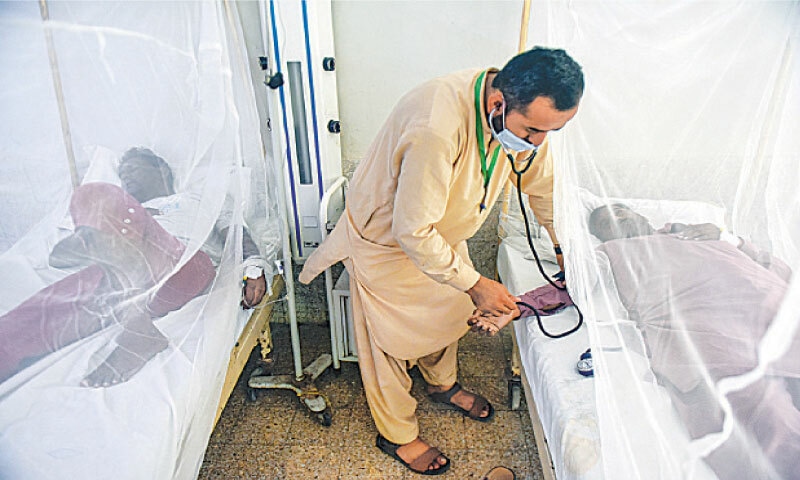• 17 deaths reported from four major private hospitals since May
• Oral rehydration, balanced diet key to dengue management
KARACHI: Dengue fever — a vector-borne viral disease which can easily be prevented by avoiding mosquito bites — has gripped the city as hundreds and thousands of patients are reporting daily at government and private hospitals as well to general practitioners, though mortalities from the disease are low, it emerged on Saturday.
Information gathered from different sources revealed that currently both private and public sector hospitals have a high number of admissions pertaining to dengue cases while the majority of people reporting at the out-patient departments and private clinics with flu-like signs and symptoms were being diagnosed to have dengue.
According to sources, five major hospitals of the city have reported no death since dengue’s outbreak this year.
These hospitals are: the Sindh Infectious Disease Hospital (SIDHRC) and Research Centre, Dow University Hospital, Dr Ruth Pfau Civil Hospital Karachi (CHK), National Institute of Child Health (NICH) and Jinnah Postgraduate Medical Centre (JPMC).
The sources said that the Aga Khan University Hospital (AKUH) had seen the highest number of deaths (11) in the last six weeks followed by the Liaquat National Hospital (LNH) with three deaths (reported between May and Sept 9), the Indus Hospital with two mortalities (reported between August 1 and Sept 8) and South City Hospital (one death).
“A total of 1,034 patients have safely recovered at LNH since May. There were only three fatalities while several patients are still under treatment,” hospital official Anjum Rizvi shared.
The three patients who died were brought in critical condition at the hospital, he added.
Dow Hospital’s Medical Superintendent (MS) Dr Zahid Azam said although dengue patients were reporting in large numbers, so far there was no mortality at the hospital.
“We are daily getting 40 to 50 patients for admission out of whom eight are admitted to the intensive care unit [ICU] while the rest are discharged in a day or two and these cases are followed up in clinics,” he told Dawn.
High frequency, low severity
According to Dr Wajid Hussain at NICH, the largest public sector hospital for children in Sindh, while the frequency of dengue cases is high this year, the disease is less severe and mortality rate is low as compared to last year’s.
“Out of the 510 children screened since August, more than half, 282, found to be dengue positive. There is no death,” he said, adding that the mortality rate was two to three per cent in dengue cases last year at the hospital and that 40pc of the patients being tested these days at the facility were dengue positive.
SIDHRC MS Dr Abdul Wahid Rajput said currently 49 patients were under treatment at the facility and eight of them were children.
He seconded Dr Hussain’s opinion and said the number of dengue cases was 50pc higher this year and that several patients awaited admission but the hospital had run out of space.
According to experts, oral rehydration and a balanced diet is the key to dengue management.
“The disease gets serious when people stop eating and drinking as they feel lethargic and nauseous. In other cases, patients don’t take the illness seriously, opt for self-medication and seek medical intervention only when things go out of control,” Dr Rajput explained and added blood transfusion was required in very few cases.
Sharing CHK’s data, Dr Nasrullah Memon, the additional MS of the hospital, said 1,700 patients had been admitted and treated at the facility since August with no death.
“Dengue fever treatment requires timely and proper rehydration of fluids and electrolytes to limit serious consequences caused by dehydration, such as shock. Unfortunately, this is often ignored by doctors who focus more on blood transfusion, which is required in few cases,” he pointed out.
About the dengue status at JPMC, deputy executive director of the hospital Dr Yahya Tunio said 64 dengue patients had been treated from August till date with no death. “Today, seven more patients are admitted while 40pc of the samples being tested at the hospital laboratory are being detected as that of dengue.”
About the 11 reported deaths at AKUH, health department spokesperson Mehar Khurshid explained that a meeting was being held between the hospital representatives and the health department officials on the subject on Tuesday. “Some of these deaths seem to have occurred due to co-morbidity. We need to discuss what actually should be defined as a clear case of death from dengue.”
Published in Dawn, September 11th, 2022













































